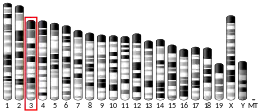Latrophilin 2
Latrophilin 2 is a protein that in humans is encoded by the ADGRL2 gene.[5][6]
This gene encodes a member of the latrophilin subfamily of G-protein coupled receptors (GPCR). Latrophilins may function in both cell adhesion and signal transduction. In experiments with non-human species, endogenous proteolytic cleavage within a cysteine-rich GPS (G-protein-coupled-receptor proteolysis site) domain resulted in two subunits (a large extracellular N-terminal cell adhesion subunit and a subunit with substantial similarity to the secretin/calcitonin family of GPCRs) being non-covalently bound at the cell membrane. While several transcript variants have been described, the biological validity of only one has been determined.[6]
See also
References
- GRCh38: Ensembl release 89: ENSG00000117114 - Ensembl, May 2017
- GRCm38: Ensembl release 89: ENSMUSG00000028184 - Ensembl, May 2017
- "Human PubMed Reference:". National Center for Biotechnology Information, U.S. National Library of Medicine.
- "Mouse PubMed Reference:". National Center for Biotechnology Information, U.S. National Library of Medicine.
- White GR, Varley JM, Heighway J (Apr 2000). "Genomic structure and expression profile of LPHH1, a 7TM gene variably expressed in breast cancer cell lines". Biochimica et Biophysica Acta (BBA) - Gene Structure and Expression. 1491 (1–3): 75–92. doi:10.1016/s0167-4781(00)00020-8. PMID 10760572.
- "Entrez Gene: LPHN2 latrophilin 2".
Further reading
- Südhof TC (2001). "alpha-Latrotoxin and its receptors: neurexins and CIRL/latrophilins". Annual Review of Neuroscience. 24 (1): 933–62. doi:10.1146/annurev.neuro.24.1.933. PMID 11520923.
- Ushkaryov YA, Volynski KE, Ashton AC (Apr 2004). "The multiple actions of black widow spider toxins and their selective use in neurosecretion studies". Toxicon. 43 (5): 527–42. doi:10.1016/j.toxicon.2004.02.008. PMID 15066411.
- Bonaldo MF, Lennon G, Soares MB (Sep 1996). "Normalization and subtraction: two approaches to facilitate gene discovery". Genome Research. 6 (9): 791–806. doi:10.1101/gr.6.9.791. PMID 8889548.
- Nagase T, Ishikawa K, Suyama M, Kikuno R, Miyajima N, Tanaka A, Kotani H, Nomura N, Ohara O (Oct 1998). "Prediction of the coding sequences of unidentified human genes. XI. The complete sequences of 100 new cDNA clones from brain which code for large proteins in vitro". DNA Research. 5 (5): 277–86. doi:10.1093/dnares/5.5.277. PMID 9872452.
- White GR, Varley JM, Heighway J (Dec 1998). "Isolation and characterization of a human homologue of the latrophilin gene from a region of 1p31.1 implicated in breast cancer". Oncogene. 17 (26): 3513–9. doi:10.1038/sj.onc.1202487. PMID 10030676.
- Kreienkamp HJ, Zitzer H, Gundelfinger ED, Richter D, Bockers TM (Oct 2000). "The calcium-independent receptor for alpha-latrotoxin from human and rodent brains interacts with members of the ProSAP/SSTRIP/Shank family of multidomain proteins". The Journal of Biological Chemistry. 275 (42): 32387–90. doi:10.1074/jbc.C000490200. PMID 10964907.
- Bjarnadóttir TK, Fredriksson R, Höglund PJ, Gloriam DE, Lagerström MC, Schiöth HB (Jul 2004). "The human and mouse repertoire of the adhesion family of G-protein-coupled receptors". Genomics. 84 (1): 23–33. doi:10.1016/j.ygeno.2003.12.004. PMID 15203201.
- Clark TA, Schweitzer AC, Chen TX, Staples MK, Lu G, Wang H, Williams A, Blume JE (2007). "Discovery of tissue-specific exons using comprehensive human exon microarrays". Genome Biology. 8 (4): R64. doi:10.1186/gb-2007-8-4-r64. PMC 1896007. PMID 17456239.
This article incorporates text from the United States National Library of Medicine, which is in the public domain.




